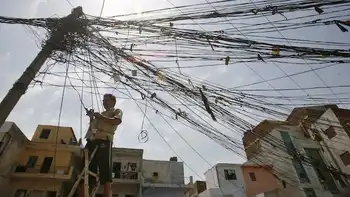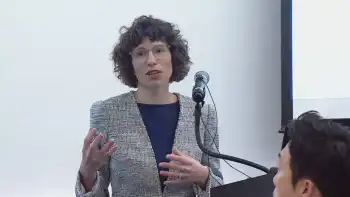National Grid addresses problem of aging workforce
WALTHAM, MASSACHUSETTS - According to a recent report by the U.S. Power and Energy Engineering Workforce Collaborative, about 45 percent of the engineers currently employed by the NationÂ’s electric and natural gas utilities will be eligible for retirement over the next five years, creating a need for more than 7,000 engineers industry wide.
At the same time, there is a significant decline in the number of students who are choosing to study engineering and related disciplines. As a result, the nationÂ’s utilities are facing what could become a crisis situation unless this trend is reversed.
Enter National Grid. Like other utilities across the country, National Grid is facing a looming shortage of engineers to build the next generation of its energy delivery system, including smart grids and other emerging high-tech systems.
National Grid is taking action to address this challenge with its innovative and comprehensive “Engineering Our Future” initiative to inspire youth and attract and develop engineers. National Grid already has invested more than $3 million in this program to target students of all ages and backgrounds to encourage them to study science, technology, engineering and math, collectively known as “STEM.”
“We depend on engineers to design and build our systems to deliver energy to our customers safely and reliably,” National Grid President Tom King said. “We must act now to create a corps of smart, dedicated and highly trained engineers to develop innovative technologies and renewable energy solutions to meet the ever changing needs of our customers.”
The centerpiece of “Engineering Our Future” is a new program called the “Engineering Pipeline.” The Pipeline is a six-year development program that creates a recruitment pathway for promising high school students who want to become engineers. About 60 students from across National Grid’s service area in New York and New England may participate in the Pipeline program each summer for development programs, job shadow and mentoring opportunities and social networking activities. Students will have an opportunity to apply for 15 paid internships during the third, fourth and fifth year of the Pipeline program.
Pipeline program applicants must have completed their junior year of high school, have a 3.5 cumulative GPA, provide evaluations from two teachers and submit a 250-word essay illustrating their desire to learn about engineering. Once accepted into the program, students must maintain a 3.5 GPA, pursue an engineering degree and participate in ongoing Pipeline program activities in order to be considered for fast-track employment with National Grid. The company plans to launch the Pipeline program this summer.
At the same time that demand for engineering is going up, engineering is becoming a less popular career choice. According to the American Society for Engineering Education, engineering bachelorÂ’s degrees declined in 2007 for the first time since the 1990s, ending seven years of growth. The trend is predicted to continue for several years, as undergraduate enrollment dropped in both 2004 and 2005.
“We need to make sure that all students have the option to choose engineering as a career path, and that means being properly prepared in elementary, middle and high school,” King added.
National Grid already has made significant investments in many community-based projects, funding research centers to support new and exciting technologies and partnering with organizations that provide programs to educate teachers as well as students in the STEM curriculum. The following are just a few examples of these programs:
Elementary through high school
• Energy Explorer – a National Grid interactive Web site with educational materials for use in classrooms that focus on building science, technology, engineering and math skills and aim to enhance energy efficiency awareness among teachers and students.
• Boston Children’s Museum, “Our Green Trail” – an energy-efficiency education program designed to teach children and their families how to mitigate the effects of climate change and take positive steps toward living environmental-minded lives.
• Green Education Foundation “Green Energy Challenge” – more than 30,000 students from 70 schools in National Grid’s service area will conduct energy audits around their schools and homes to locate and correct energy leaks in an effort to reduce energy costs by five percent by Earth Day, April 22.
• NYU-Poly – as a “PolyPartner” National Grid provides mentoring and educational opportunities for talented middle and high school students in science, engineering and mathematics beyond those regularly available in courses and laboratories at students’ schools.
• University of Buffalo – National Grid is expanding the university’s award-winning BEAM (Buffalo-area Engineering Awareness for Minorities) program with a new five-year program aimed at introducing Buffalo Public School students in grades 6-12 to careers in biomedical and green energy industries.
• Hofstra University summer science green research project – a six-week workshop designed to focus high school students on environmental issues and awareness.
Colleges and universities
National Grid is actively working with a number of colleges and universities around its service area to invest in engineers and support the companyÂ’s development and recruitment efforts. Examples include:
• Clarkson University – the “National Grid Student Research Opportunities in Sustainable Energy,” an endowed program to support engineering education and research opportunities for up to five summers for Clarkson Honors Program students studying sustainable energy.
• Tufts University – in partnership with the Boston Architectural College, students researched, designed and built a solar-powered house to compete in “Curio House,” the Solar Decathlon contest for the U.S. Department of Energy and National Renewable Energy Laboratory’s biannual international solar energy competition.
• City College of New York Grove School of Engineering – the “Success in Undergraduate Engineering (SUE)” program provides scholarships for National Grid SUE Scholars and introduces girls beginning in the 6th grade to engineering through workshops and mentoring opportunities with female engineers.
Related News

Berlin urged to remove barriers to PV
BERLIN - The German Solar Association (BSW) has called on the government to remove barriers to the development of new solar and storage capacity needed to replace coal and nuclear generation that is being phased out.
A 52GW cap should be scrapped, otherwise there is a risk that a market slump will occur in the solar industry after 2020, BSW said.
BSW managing director Carsten Körnig said: “Time is running out, and further delays are irresponsible. The 52GW mark will already be reached within a few months.”
A new report from BSW, in cooperation with Bonn-based marketing and social research company EuPD…




